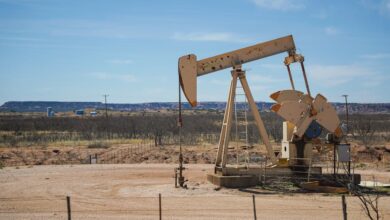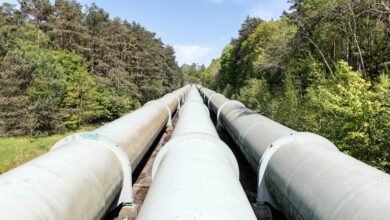Shale Oil and Fracking: Transforming the Oil Market Landscape and Environmental Future

The extraction of crude oil from shale formations has transformed the energy landscape, particularly with the advent of fracking technology. As a method that allows for the efficient and economical recovery of oil reserves previously deemed inaccessible, shale oil has reshaped the dynamics of the global oil trade and influenced oil market trends significantly. This introduction of shale oil into the energy mix has not only impacted oil prices but also raised questions about energy security and the future of oil consumption. As we delve deeper into the role of fracking technology in crude oil extraction, we will explore the effects of shale oil on the global oil trade, examine the environmental impact of oil extraction practices, and discuss the future alternatives to shale oil, including biofuels and other oil alternatives. Additionally, we will consider the implications for oil regulation and compliance, as well as the geopolitics surrounding oil investments and supply chains. Join us as we navigate this complex landscape of oil technologies, exploring how shale oil and its extraction techniques are shaping the future of the energy sector.
- 1. Understanding Shale Oil: The Role of Fracking Technology in Crude Oil Extraction
- 2. The Impact of Shale Oil on Global Oil Trade and Market Trends
- 3. Environmental Concerns and Future Alternatives in the Shale Oil Industry
1. Understanding Shale Oil: The Role of Fracking Technology in Crude Oil Extraction
Shale oil refers to the crude oil that is trapped within shale formations, a type of sedimentary rock rich in organic material. The extraction of this oil has significantly transformed the energy landscape, particularly through the use of fracking technology. Fracking, or hydraulic fracturing, is a method that involves injecting high-pressure fluid into the rock formation to create fractures, allowing oil to flow more freely to the surface. This technique has made previously inaccessible shale oil reserves viable, contributing to a marked increase in oil production in countries like the United States.
The role of fracking technology in crude oil extraction cannot be overstated. It has led to a surge in domestic oil production, which has implications for global oil market trends, particularly in relation to OPEC and its influence over oil prices. As shale oil production rises, it can contribute to greater energy security for nations reliant on oil, reducing dependence on foreign oil supplies. However, this growth in production can also lead to fluctuations in oil prices, impacting the global oil trade and oil consumption patterns.
Moreover, advancements in oil technologies associated with fracking have improved the efficiency of extracting oil from shale formations. This has spurred investments in oil field services and infrastructure, including oil storage and transportation networks such as pipelines. The integration of these technologies has enhanced the resilience of oil supply chains, making it easier for crude oil to move from production sites to refineries.
However, the environmental impact of oil extraction, particularly through fracking, has raised significant concerns. Issues such as water usage, potential groundwater contamination, and the release of methane, a potent greenhouse gas, have led to calls for stricter oil regulation and compliance measures. As the conversation around energy evolves, discussions about oil alternatives, such as biofuels, are becoming increasingly relevant, especially in the context of oil geopolitics and the future of energy consumption.
In summary, understanding shale oil and the role of fracking technology in crude oil extraction is crucial for grasping current trends in the oil market. As we navigate the complexities of oil investing and the implications for energy security, it is essential to balance the benefits of increased oil production against the potential environmental consequences, ensuring sustainable practices within the oil industry.
2. The Impact of Shale Oil on Global Oil Trade and Market Trends
The emergence of shale oil has profoundly transformed the global oil trade and influenced market trends. As countries like the United States have harnessed advanced fracking technology to extract oil from shale formations, this has led to a significant increase in oil production. The United States has become one of the world's largest producers of crude oil, which has shifted the balance of power within the oil market, traditionally dominated by OPEC.
With the rise of shale oil, oil prices have experienced increased volatility. The surge in production has often outpaced global demand, leading to fluctuations that impact oil market trends. As shale oil production continues to grow, it influences the dynamics of oil supply chains, prompting OPEC to adjust its production levels to stabilize prices. This interaction between shale oil output and OPEC's strategies highlights the growing importance of shale resources in the context of oil geopolitics.
Moreover, the integration of shale oil into the global oil trade has implications for energy security. Countries with substantial oil reserves can leverage this resource to reduce dependency on foreign oil, enhancing their energy independence. However, the environmental impact of oil extraction, particularly through fracking, raises concerns about sustainability. As a result, there is an increasing interest in oil alternatives, including biofuels and other renewable energy sources, which can mitigate the environmental repercussions associated with oil consumption.
The expansion of shale oil production also drives innovation in oil technologies, affecting downstream oil processes such as refining and petrochemicals. Companies involved in oil field services are adapting to support shale operations, which demand specific techniques for extraction and transportation. This evolution in oil exploration and extraction is accompanied by a need for strict oil regulation and compliance to ensure responsible practices.
As investors analyze the future of oil markets, oil price hedging strategies become fundamental in navigating the uncertainty brought about by fluctuations in oil prices. Shale oil's impact on global oil markets will continue to shape the landscape, influencing everything from oil storage and transportation to the strategies of oil companies and investors alike. The interplay between shale oil and traditional offshore drilling further complicates the picture, as both sectors vie for market share amidst changing consumer demands and regulatory frameworks.
In summary, shale oil's influence on global oil trade and market trends is profound, reshaping not only production dynamics but also the broader economic and environmental conversations surrounding energy security and the future of oil consumption.
3. Environmental Concerns and Future Alternatives in the Shale Oil Industry
As the shale oil industry continues to expand, environmental concerns have emerged as a significant aspect of the ongoing debate over its viability and sustainability. The extraction of crude oil from shale formations using fracking technology poses several environmental risks, including water contamination, air pollution, and the disruption of local ecosystems. The environmental impact of oil extraction not only affects surrounding communities but also raises questions about the long-term sustainability of oil consumption.
One of the primary issues associated with shale oil extraction is the large volume of water required for fracking. This process involves injecting a mixture of water, sand, and chemicals into the ground to fracture the rock and release oil. The potential for water contamination from both the chemicals used in the process and the release of hydrocarbons raises significant concerns regarding the safety of groundwater supplies. Additionally, the disposal of wastewater generated during the fracking process can lead to further environmental hazards.
Air quality is another concern, as the extraction and transportation of shale oil can release volatile organic compounds (VOCs) and methane, a potent greenhouse gas. These emissions contribute to air pollution and have implications for public health, as well as climate change. The oil market trends indicate a growing awareness of these issues, and many stakeholders are calling for stricter oil regulation and compliance measures to mitigate the environmental impact of oil extraction.
Looking to the future, there is a growing interest in exploring alternatives to shale oil. The development of biofuels and other renewable energy sources is seen as a critical step toward achieving energy security and reducing dependency on fossil fuels. As global oil trade dynamics shift and OPEC continues to play a pivotal role in oil supply chains, the exploration of oil alternatives becomes increasingly vital. Innovations in oil technologies, such as carbon capture and storage, may also offer solutions to minimize the environmental footprint of oil extraction and refining processes.
Moreover, as oil prices fluctuate and oil price hedging becomes essential for investors, attention is drawn to the potential of offshore drilling and oil sands as alternative sources of crude oil. However, these methods also come with their own set of environmental concerns. Thus, the oil industry must navigate a complex landscape where the balance between meeting energy demands and protecting the environment remains at the forefront of discussions.
In conclusion, while shale oil extraction offers economic opportunities, the environmental implications cannot be overlooked. The future of the shale oil industry will likely depend on the adoption of sustainable practices, effective oil regulations, and a commitment to exploring cleaner energy alternatives that align with global efforts to combat climate change.
In conclusion, the extraction of shale oil through fracking technology has significantly transformed the landscape of the global oil trade, influencing oil market trends and reshaping energy security. As we have explored, shale oil has not only altered the dynamics of crude oil production but also posed challenges related to environmental impact and regulatory compliance. The balance between maximizing oil reserves and minimizing the ecological footprint remains a critical concern for stakeholders in the oil industry.
Looking ahead, the future of shale oil will likely depend on advancements in oil technologies, oil field services, and the exploration of alternative energy sources, such as biofuels and natural gas. As OPEC and other players in the oil market navigate these changes, investors must stay informed about oil price fluctuations and the complexities of oil transportation, storage, and supply chains. As the industry continues to evolve, embracing sustainable practices and innovative solutions will be key to addressing the pressing environmental concerns associated with oil consumption and refining. Ultimately, the journey toward a more balanced and responsible approach to energy production will shape the next chapter in the story of shale oil and its role in the global energy landscape.





